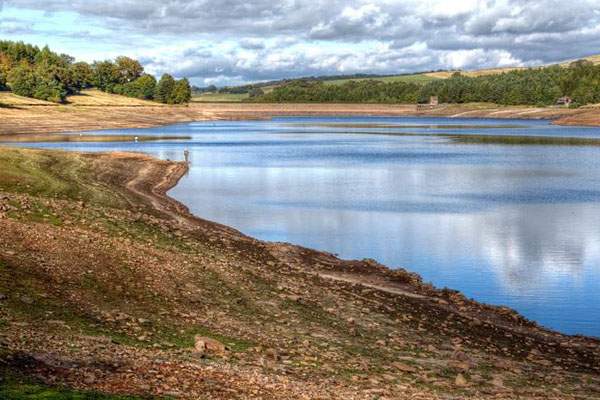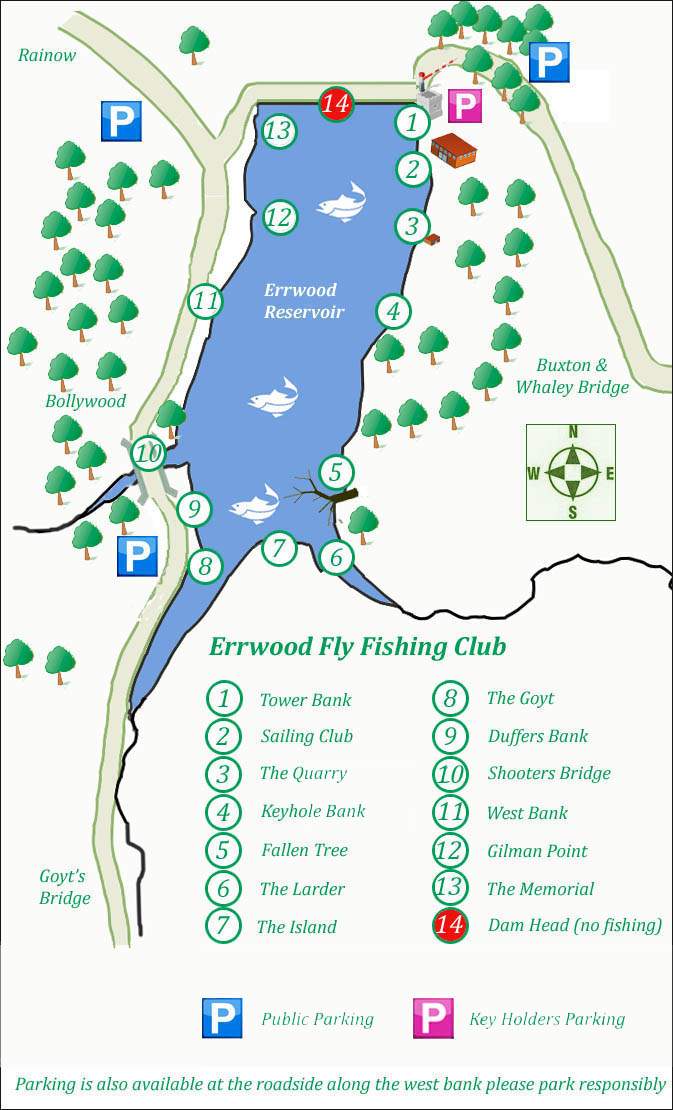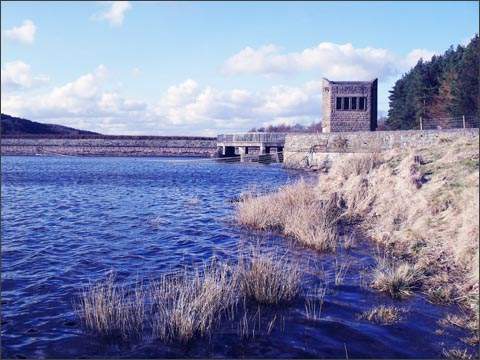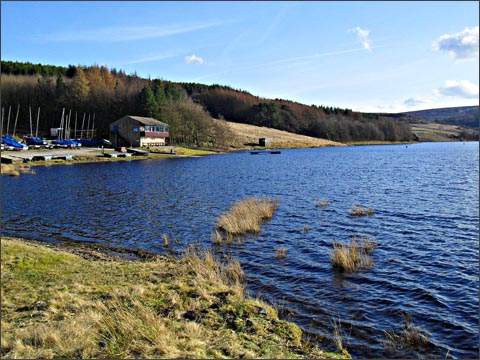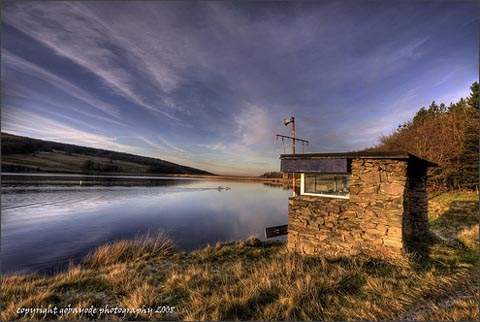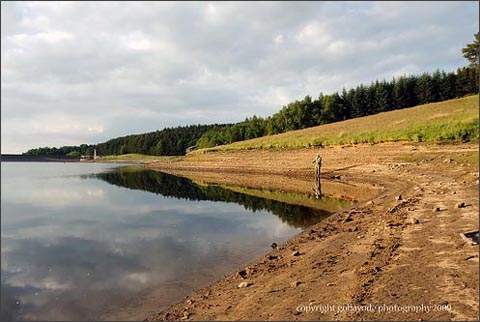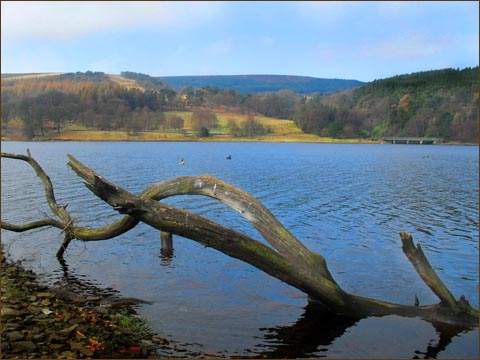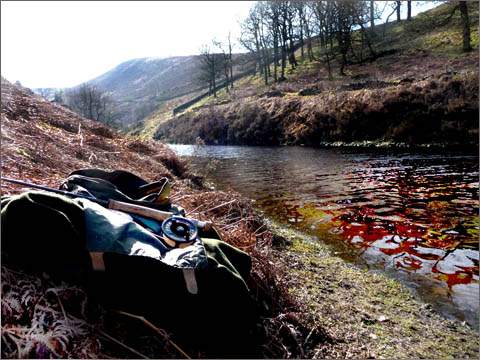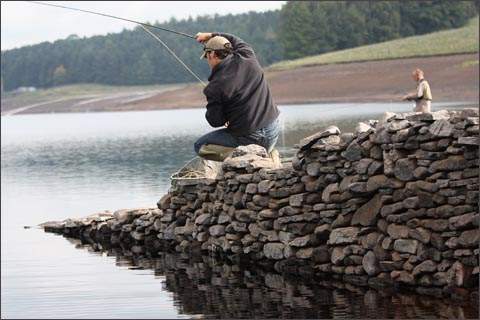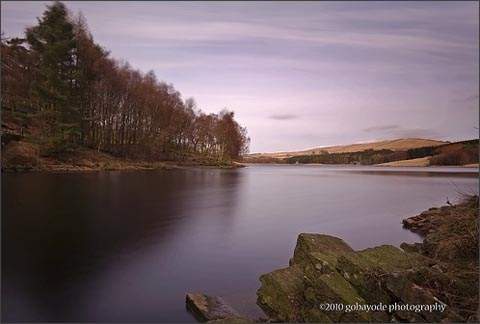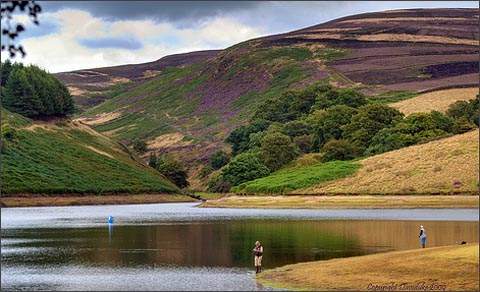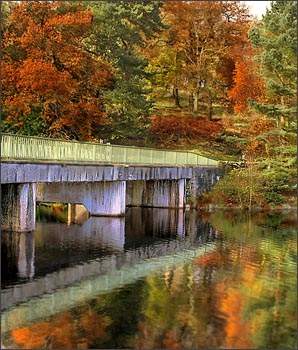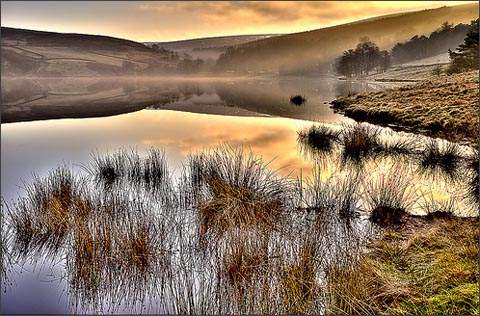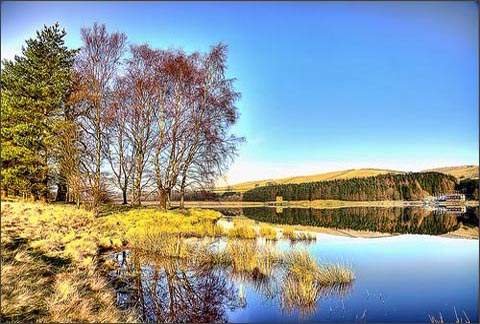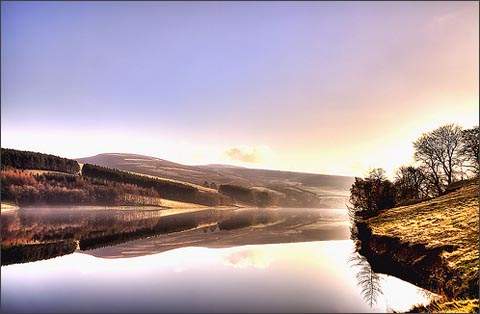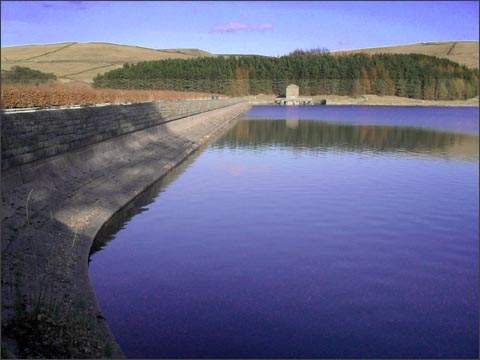Errwood Reservoir
Errwood Reservoir is regularly stocked with beautiful Rainbow Trout, ranging in sizes; as well as this, the water is also home to some Brown Trout, both stocked and naturally habiting.
Below is a map of the reservoir and some information regarding various areas of the scenic water.
Fishing Spots
1. Tower Bank
As the predominant wind blows towards Tower Bank and water is run off
via the valve tower, there is usually a good bet that there will be the
odd fish hanging around this area
Fishing here is not for the faint hearted. If there is any wind at
all, it will seem to be intensified on Tower Bank and blowing straight at
you, while other areas, such as at Duffers Bank there will be barely a
ripple! Expect some tackle losses flies as the shallow water close in is
littered with huge boulders, ready to snag any fly fished too deep,
however these boulders provide safety for large shoals of minnows and
ambush points for hungry trout.
2. Sailing Club
The Sailing Club area offers accessible fishing with easy back casting.
Please note there should be no fishing directly in front of the
Sailing Club and members of the Sailing Club have the right of way at
all times in this area. Please be considerate of anyone we share the
water with.
The Sailing Club area offers accessible fishing with easy back casting.
The shallow bay in the picture has a gravel bed which is where the
majority of the resident minnows come to spawn. This bay will disappear
completely when the water level lowers.
Although the area is quite shallow when the water levels are very low
you will be casing into very deep water, as can be seen in the drought
picture below. This is one of the reasons why there is a no wading rule
at Errwood.
Fishing here is quite consistent and there are a lot less under water obstacles than the Tower Bank.
3. The Quarry
Stone from the area directly in front of the sailing hut was quarried
to build the dam wall. Because of this there is an underwater cliff
face that plummets to depths in excess of 100 foot. Fishing here can be
hit or miss but fish are known to shoal here and in the bay to the south
when they disappear from other parts of the lake. This area can prove
fruitfull when there are a lot of terrestrials on the water.
The shallower bay can also be a good spot for the resident brown trout
but tackle usually has to be down sized to catch these fish. It is one
of the less fished parts of Errwood with most anglers only giving it the
occasional cast as they make their way down to the fallen tree, however
there have been quite a few large fish taken from this area.
4. Keyhole Bank
Keyhole Bank runs from the bay south of the Sailing Hut until the
Fallen Tree. The bank was named by Grace Fowler, when viewed from the
West Bank the trees appear to be in the shape of a traditional keyhole.
This is a long stretch of water and suits those anglers who prefer to work the bank. Fish, especially resident brownies, can be taken close to the bank with features such as submerged dry stone walls often holding numbers of predatory rainbows. Drifting small flies on the wind is often a successful technique.
5. Broken Tree
The Fallen Tree is one of the favourite areas of anglers prepapred to walk down the East Bank. Due to its distance from a parking space the Tree gets less attention
than other more accessible areas however it can be one of the most
productive areas on Errwood. This area covers the Tree itself and a
small cutting created by the old road that ran through the valley. The
road can hold numbers of fish and if the water level is high enough
there is usually a fish or two around the tree.
This area also holds a large number of the natural brown trout. There
are plenty of trees surrounding this area and in summer large ferns grow
on the banks providing food for the trout on windy days. Early season
can often see the fish feeding on frogspawn and tadpoles.
6. The Larder
The location of one of Errwood's three feeder streams, the Larder is
named because it’s one of the few places where there is an abundance of
natural food.
Fish often congregate around the submerged dry stone walls and
natural features of this area. Care must be taken as deep water can be
found within inches of the bank.
Natural patterns will bring the best results here, keeping things small will also attract the resident brownies. .
7. The Island
The most inaccessible and possibly one of the best, if not the best, fishing spots on Errwood.
Due to its location the Island is probably the most under fished
areas of the reservoir and will always have a few resident fish. The
island gets its name from appearing to be cut off from all land by the
Larder feeder stream and the River Goyt.
Gently sloping banks into shallow then deeper water with submerged
features and protection from the wind, which is mainly from behind
(blowing food onto the water), makes this an ideal place to fish. The
30+ minute walk over uneven ground through waist high ferns is not for
the faint hearted and certainly not for the Club Members with just an
hour or so to spare.
It’s not uncommon for anglers to be struggling on Duffers Bank while
just a few hundred yards away (by boat!) the solitary angler on the
Island is having an easier time.
8. The Goyt
The main water source for Errwood Reservoir is the River Goyt. The
river begins on the bleak moors of Axe Edge, over looking Buxton, near
the Cat and Fiddle Inn.
The river fed by springs and streams makes its way down the Upper
Goyt Valley, past Derbyshire Bridge and into the reservoir. A section of
the river a few hundred yards long is fishable to the south of Errwood
Reservoir, the water is deep and slow moving. In the summer fish can
often be found here due to the cooler water entering the reservoir.
Please note anyone taking their car up the Goyt River will have entered
the Upper Goyt one way system and should not turn around and drive back
towards the reservoir.
9. Duffers Bank
One of the most popular areas on Errwood is Duffers Bank.
Easy back casting, parking within 30 yards, protection from the wind
and always fish in front of the angler make this a popular spot.
The water here is shallower than most parts of the reservoir but there
are many holes, drop offs and underwater features, caused by the River
Goyt and tracks made by/for the machinery used to create the reservoir.
10. Shooters Bridge
A small feeder stream emerges from the moorlands above Errwood
Reservoir and winds its way down the valley until it enters Errwood at
Shooters Clough Bridge.
One of the most visited areas of the Upper Goyt Valley is Shooters
Clough, popular walks include the ruins of Errwood Hall and the Spanish
Shrine. A small feeder stream emerges from the moorlands above Errwood
Reservoir and winds its way down the valley until it enters Errwood at
Shooters Clough Bridge. The area in front of the bridge can be fished
from either Duffers Bank or the West Bank. The water here is very deep
close in with depths in excess of 50 feet.
During summer months especially in holiday periods this area can become
popular with tourists who seem intent on trespassing onto United
Utilities land; however our bailiffs, the police, landowners and park
rangers our doing their best to prevent public access to the banks.
When water levels are very low machinery left in the reservoir is visible from the bridge.
11. West Bank
The West Bank is the longest stretch of fishing on Errwood Reservoir.
Easily accessible with plenty of roadside parking makes this a
favourite with many anglers.
Casting here is easy with plenty of open space behind. The water
appears shallow close in but there are many holes, drop offs and fish
holding features. In the early parts of the season shoaled fish will
move up and down the banks.
As with most parts of Errwood changing your location here by just a few
yards can have instant success, fishing light and working the bank can
give you an enjoyable and rewarding days fishing.
Warning on hot, still summer nights insect repellent or a good midge net
is recommended, the fish might feed on the midges but the midges will
feed on you!
13. The Memorial
This area can probably only accommodate two anglers but on its day can be one of the most productive areas on the water. This small corner of the reservoir catches terrestrials from the surrounding trees and, at the right time of year, large swarms of flying ants!
14. Dam Head (NO FISHING)
The Dam Wall is off limits for fly fisherman, casting here would not
only be difficult because of the steep wall it would also be a danger to
members of the public.
Anyone found fishing off the Dam Wall on a day ticket could face expulsion from the water. Wherever you are fishing on Errwood Banks please fish safely. Please respect the Clubs Rules, general public and other water users.
